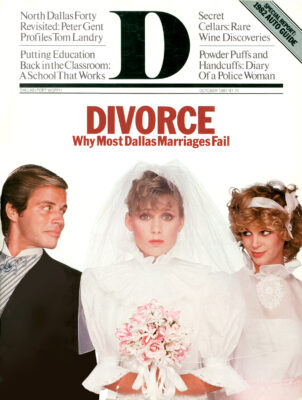THE WHOLE PROCESS took a minute and 48 seconds. None of our three voices ever raised a fraction of an octave above a perfect monotone. None of us ever made eye contact. I stared passively at the imitation wood railing that hit me at waist level. My attorney glanced up only periodically as he read from a stack of papers in front of him. The judge spent the entire time perusing a sheaf of pages in a large brown folder. I assume the folder contained the documents necessary to bring my marriage to an end.
“Rowland,” my attorney asked, “were you married to Betsy Carol Waters on December 27, 1968?”
“1 was,” I responded. (Somehow, “I was” seemed so much more official than “Yes.”)
“And are you now asking that the court dissolve your marriage?”
“1 am.”
My attorney withdrew his right hand from the table, swept back his black pinstriped suit coat, and placed his thumb in the pocket of his matching vest.
“Rowland,” he asked, “are you seeking a divorce because of discord and conflict that has destroyed the legitimate ends of the marriage relationship and because there is no longer any reasonable expectation of reconciliation?”
The question temporarily took my breath away. It was not that any of the components of the question didn’t fit; it’s just that verbalizing them in that manner took a sledgehammer to my psyche. I gasped slightly and managed a monotonal response.
“I am.”
From that point on, I lapsed into a daydream, which was quickly interrupted when the judge looked up and announced: “I’m going to grant this divorce.”
That was it. Over. Twelve years, seven months, and 14 days of marriage ended in less time than it had taken me to find a parking place at the courthouse that day.
The judge can certainly be forgiven if he failed to summon up any feelings for this stranger who stood before him. Mine was the eleventh marriage he had dissolved during the first hour of his morning on the bench. My case came just after that of the wife of the Frito-Lay route salesman ($50 a week in child support; she gets the house; he gets the Winnebago) and just before that of the Texas International stewardess who had chosen to end her blissful state of matrimony eight months after it began (no children, no community property, very few memories).
In order to simply keep up with the case load, each of the seven “family district court” (divorce) judges in Dallas County must handle about 40 cases every work day. After all, more than 22,000 couples file for divorce in Dallas each year. We have the highest divorce rate of any major city in America. It takes a quick gavel just to keep up with the hordes of disenfranchised marital partners who flock to the fourth floor of the Old Red Courthouse, demanding that the court put asunder what God and some justice of the peace have joined.
WE HAD been so smug about it. Perhaps we had been a little condescending to our divorced friends. By the time we were in our tenth year of marriage, every couple we knew had been divorced at least once. In many cases, the marriage had ended five or six years after it had started. And in a lot of cases, by the time our friends had been out of college for a decade they had married, divorced, and remarried. So when we celebrated our tenth wedding anniversary, it was like paying off the deed to a tract of land. We declared the marriage to be permanent.
And by contemporary standards, it was. We both fully believed that our marriage was different. We were practitioners of the old-fashioned art of marriage in perpetuity. Till death do us part.
It was quite obvious to us that all those failed marriages that occurred among our friends had simply not been real marriages. They obviously had started out all wrong. They hadn’t taken their marriage vows seriously enough. We assumed they had never been really in love in the first place. Our marriage, we told ourselves in self-congratulatory tones, was truly an adult, serious, permanent bond. We never even thought about divorce. Consciously.
We took the traditional old-school view that divorce was failure. Since neither of us was programmed to fail at anything we attempted, divorce was simply out of the question. In the end, of course, that attitude set up an incredible paradox. We assumed that our marriage would last forever, so we deferred solving its problems. Why deal with a problem now when you can avoid it and deal with it later? It was as a result of that philosophy that I ultimately found myself sitting in 255th District Court waiting for my name to be called. Mine joined the legions of the 22,000 broken marriages with no more fanfare than is afforded someone who had gone into wedlock thinking, “What the hell, if it doesn’t work, I’ll bail out.”
The common denominator of American marriages seems to be that they end. The good ones and the bad ones, the torrid and the tepid; all seem to have an end that is a certain consequence of the mere fact that they began. It is a manifestation of one of the basic tenets of the contemporary American culture: Nothing is permanent. The only way a couple can say, “Till death do us part” with any amount of certainty is if one of them has leukemia.
Our grandfathers, or our fathers, for that matter, would consider this generation’s policy of disposable matrimony to be a fundamental weakness that will cause our society to eventually crumble as easily as our marriages have. That, I would suggest, is simply hogwash. We have not defiled or devalued what our ancestors considered the sacred institution of marriage, we have merely redefined our expectations of that institution.
It is a strength, not a weakness, that most adults in America today would rather end a marriage that has stopped functioning than continue an agonizing relationship for the sake of preserving the titular institution of holy matrimony. Perhaps our values are not so different from those of previous generations. Most people today want meaningful marriages, relationships that cause bells to ring and chimes to sound in our ears. And when we no longer hear the bells and the chimes, we’ve become mature enough to end our marriages and begin our search for happiness all over again. Perhaps we are actually more romantic than previous generations. Our marriages often fail because we have high expectations and romantic notions from the start.
Are we hopeless romantics? Probably. After all, as I stood there daydreaming in 255th District Court, I kept asking myself a single question: Was all the pain and anxiety worth it? Did the peaks justify the valleys? Would 1 do it all over again?
I would.
Related Articles

Business
Gensler’s Deeg Snyder Was a Mischievous Mascot for Mississippi State
The co-managing director’s personality and zest for fun were unleashed wearing the Bulldog costume.
By Ben Swanger

Local News
A Voter’s Guide to the 2024 Bond Package
From street repairs to new parks and libraries, housing, and public safety, here's what you need to know before voting in this year's $1.25 billion bond election.
By Bethany Erickson and Matt Goodman

News
Methodist Charlton Names New CEO and Steward Offloads Five More Hospitals for $1.1 Billion
Plus Texas Health Mansfield's new president and CEO, TimelyCare recognized by EY, and more.
By Bridget Reis


